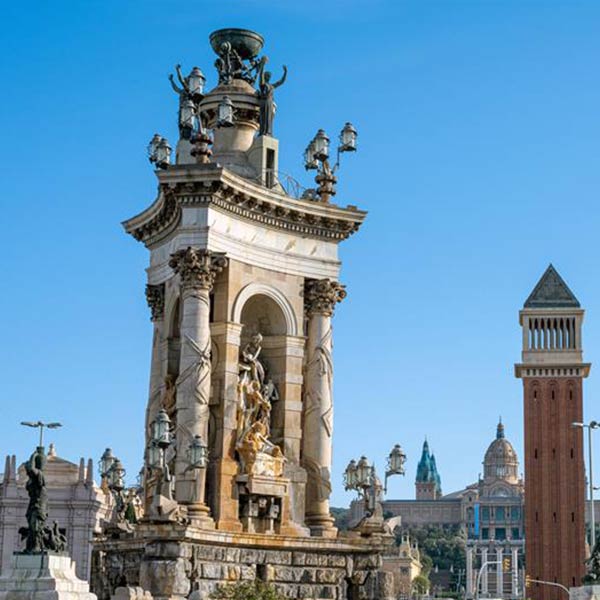Immigration, Race & Identity in Contemporary Spain
Global Business Consulting Program
Barcelona, Spain
Dates: 1/8/25 - 4/26/25

Immigration, Race & Identity in Contemporary Spain
OVERVIEW
CEA CAPA Partner Institution: CEA CAPA Barcelona Center
Location: Barcelona, Spain
Primary Subject Area: Cultural Studies
Other Subject Area: History, Political Science, Sociology
Instruction in: English
Course Code: CUL360BCN
Transcript Source: University of New Haven
Course Details: Level 300
Recommended Semester Credits: 3
Contact Hours: 45
Prerequisites: Two one-hundred or one two-hundred level courses in the subject area(s) of instruction
DESCRIPTION
"If the name and the identity of something like the city still has a meaning, could it, when dealing with the related questions of hospitality and refuge, elevate itself above nation-states or at least free itself from them in order to become, to coin a phrase in a new and novel way, a free city?...[A] certain place (diplomatic or religious) to which one could retreat in order to escape from the threat of injustice." (J. Derrida, 2001)
In recent years, immigrant and refugee movements have increasingly come to the fore in Spain and Europe. Immigration is a relatively recent phenomenon in Spain which has traditionally been a country from which people emigrated. Indeed, the word inmigrante was generally used not to refer to people from other countries but rather to people from other parts of Spain. The rising prosperity of Spain that followed its membership to the European Union reversed this trend, and from the 1990?s onwards, Spain played host to increasing numbers of foreign immigrants. Since the early 1990s the foreign born population of Spain has risen from about 1% to around 10%. The 2004 terrorist attacks in Madrid and the steady stream of Africans risking the treacherous crossing from the North African coast sharpened public awareness about this issue. This upsurge in immigration has bought about a transformation of Spanish cities as the recently arrived residents carve out a niche for themselves within the existing socio-economic order, while resident population adapts and responds to their presence.
As immigrants, asylum seekers, and refugees move 'within' and across Spanish urban borders, they impact the familiar and the 'rigid orders of the self'- to borrow the words of the German novelist Günter Grass. They thus incite an array of responses in different contexts and forms. Therefore, just as is happening in the U.S., discussions on migration to and from the country meet in that discursive space where critical concepts like 'home,' 'identity,' 'subjectivity,' and 'otherness' eschew stereotyping.
Employing cross-cultural and multi-disciplinarian approaches to the subject of how identity is formed, challenged and defended in an ever more globalized world, you investigate in this course the pressing issues of immigration, race and ethnicity that have sparked such controversy and passion both in contemporary Spain, Europe and the U.S.
To this end, your analytical focal point is placed upon the city and suburbs of Barcelona, where the presence of diverse immigrant communities offers opportunity for direct exploration of how effectively they and their second generation descendants have been incorporated and integrated into the Spanish political, economic, societal and cultural mainstream. You will therefore experience at firsthand how the city has changed in the past thirty years and how it is still changing beyond tourist stereotypes through a strong process of cultural hybridization.
Course is cross-listed with SOC360
In recent years, immigrant and refugee movements have increasingly come to the fore in Spain and Europe. Immigration is a relatively recent phenomenon in Spain which has traditionally been a country from which people emigrated. Indeed, the word inmigrante was generally used not to refer to people from other countries but rather to people from other parts of Spain. The rising prosperity of Spain that followed its membership to the European Union reversed this trend, and from the 1990?s onwards, Spain played host to increasing numbers of foreign immigrants. Since the early 1990s the foreign born population of Spain has risen from about 1% to around 10%. The 2004 terrorist attacks in Madrid and the steady stream of Africans risking the treacherous crossing from the North African coast sharpened public awareness about this issue. This upsurge in immigration has bought about a transformation of Spanish cities as the recently arrived residents carve out a niche for themselves within the existing socio-economic order, while resident population adapts and responds to their presence.
As immigrants, asylum seekers, and refugees move 'within' and across Spanish urban borders, they impact the familiar and the 'rigid orders of the self'- to borrow the words of the German novelist Günter Grass. They thus incite an array of responses in different contexts and forms. Therefore, just as is happening in the U.S., discussions on migration to and from the country meet in that discursive space where critical concepts like 'home,' 'identity,' 'subjectivity,' and 'otherness' eschew stereotyping.
Employing cross-cultural and multi-disciplinarian approaches to the subject of how identity is formed, challenged and defended in an ever more globalized world, you investigate in this course the pressing issues of immigration, race and ethnicity that have sparked such controversy and passion both in contemporary Spain, Europe and the U.S.
To this end, your analytical focal point is placed upon the city and suburbs of Barcelona, where the presence of diverse immigrant communities offers opportunity for direct exploration of how effectively they and their second generation descendants have been incorporated and integrated into the Spanish political, economic, societal and cultural mainstream. You will therefore experience at firsthand how the city has changed in the past thirty years and how it is still changing beyond tourist stereotypes through a strong process of cultural hybridization.
Course is cross-listed with SOC360







